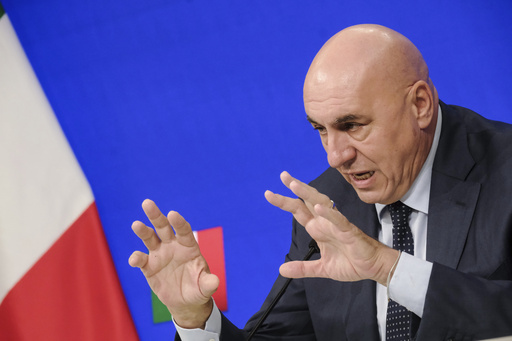BEIRUT — Recent Israeli airstrikes have targeted the headquarters of the United Nations peacekeeping force in southern Lebanon, along with other locations in the region, provoking widespread international disapproval.
The United Nations Interim Force in Lebanon (UNIFIL) reported that explosions struck its base on Friday morning, resulting in injuries to two peacekeepers, only a day after a previous Israeli attack on the same site caused injuries to two others as well.
As Israel intensifies military operations against Hezbollah in southern Lebanon, the presence of around 10,000 UN peacekeepers is increasingly vulnerable, exposing the precariousness of their situation amidst Israel’s expanding ground offensive.
This escalation occurs amidst deteriorating relations between Israel and the United Nations, particularly concerning Israel’s actions in Gaza. Earlier in the month, Israel labeled the U.N. Secretary-General as unwelcome, marking a significant low point in diplomatic interactions.
Background on UNIFIL:
The United Nations Interim Force in Lebanon was established in 1978 to supervise the withdrawal of Israeli soldiers who had invaded and occupied southern Lebanon. Following another invasion in 1982, Israel did not fully withdraw until 2000. In the lack of a defined border, the U.N. created the Blue Line, which UNIFIL monitors and patrols.
The mission of UNIFIL was expanded after the 2006 war between Israel and Hezbollah, allowing peacekeepers to maintain a presence along the Israeli frontier and patrol a designated buffer zone to oversee the cessation of hostilities. Currently, peacekeepers from around 50 countries serve in the region, tasked with monitoring and reporting on violations of U.N. Security Council Resolution 1701, which concluded the 2006 conflict, while also providing support to local populations.
Recent incidents:
On Thursday, UNIFIL accused an Israeli tank of firing directly at its headquarters located in Naqoura, leading to injuries for two Indonesian peacekeepers who required hospitalization. The peacekeeping force stated that its headquarters and surrounding areas have faced repeated attacks and that Israel had intentionally targeted monitoring equipment. Furthermore, Israeli fire was reported to have hit a nearby shelter where peacekeepers were located.
Following this, on Friday, further explosions impacted the peacekeeping base, injuring two more personnel, though UNIFIL did not directly attribute the attack to Israel. They noted that an Israeli bulldozer had also come into contact with another of their sites while tanks moved in the vicinity.
These events have resulted in global denunciations, with Italy and France summoning Israeli ambassadors in response. Italy’s defense minister described the assaults as potentially amounting to “war crimes,” a sentiment echoed by Human Rights Watch.
Strained relations between the two parties have been escalating, particularly after Israel urged UNIFIL to reposition its members further north, an appeal that the peacekeeping force rejected. “We will not endorse the claim that Israeli military forces previously advised UNIFIL to abandon certain bases,” Italy’s defense minister stated, criticizing the attacks as deliberate actions rather than mishaps.
Israel’s response:
The Israeli military conveyed deep concerns regarding Thursday’s events, stating that a comprehensive inquiry is underway at the highest command levels to ascertain the facts. On Friday, the military indicated that its response was aimed at an immediate threat and noted that UNIFIL personnel had been instructed to take cover in safe zones hours before the incident occurred.
Additionally, the army accused Hezbollah of intentionally operating near U.N. installations, thus putting peacekeepers at risk. Throughout the ongoing conflict, UNIFIL has reported various incidents of being fired upon or shelled by Israeli forces.
Historical context:
UNIFIL’s relationship with Israel has been tumultuous, marked by past incidents such as the 1996 shelling of a U.N. compound in Qana during an Israeli offensive against Hezbollah, which resulted in the deaths of 106 civilians, including 37 children, and injuries to four Fijian peacekeepers.
Impact on UNIFIL’s mission:
The Israeli military has requested that UNIFIL relocate its personnel 5 kilometers north to avoid involvement in the conflict with Hezbollah, a move that impedes the peacekeeping force’s operations.
Jean-Pierre Lacroix, the U.N. peacekeeping chief, informed an emergency U.N. Security Council meeting that UNIFIL would resist vacating its positions, but ongoing air and ground assaults have made patrols infeasible. He pointed out that the resurgence of hostilities since late September has drastically confined peacekeepers, limiting their ability to carry out their duties, and complicating the resupply of essentials like food and water.
Following Thursday’s events, Lacroix announced that 300 peacekeepers stationed in vulnerable areas were temporarily moved to larger bases, and that additional relocations would depend on evolving security conditions. The U.N. peacekeeping operations saw a reduction of about 20% in some southern regions, as announced on October 3.
Nick Birnback, the chief of strategic communications for U.N. peacekeeping, affirmed that UNIFIL has consistently maintained its presence along the Blue Line since its inception. The Italian defense minister reiterated that any final decisions regarding the continuation of UNIFIL’s mission would ultimately lie with the United Nations.



